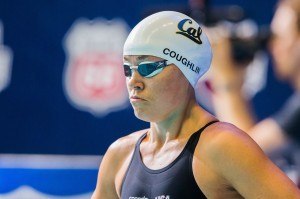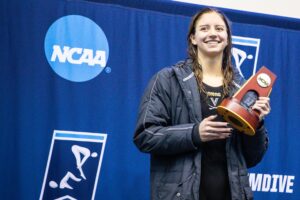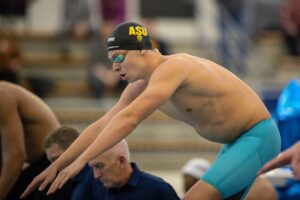When you account for NCAA titles, dominance, versatility, and records, Natalie Coughlin, Caeleb Dressel, Kate Douglass, and Leon Marchand are with little argument the greatest NCAA swimmers of the 21st century (so far).
To start things off, it’s important to note that out of the 46 NCAA Championships that have occurred in the 21st century, there have been only five performances where a swimmer went three-for-three in individual events and broke NCAA records in all of their individual swims—which is essentially the perfect NCAA performance. Coughlin (2002), Dressel (2018), Douglass (2023), and Marchand (2023) account for four of these performances, while Florida’s Ryan Lochte pulled off the fifth one in 2006. Another thing that sets Coughlin, Dressel, Douglass, and Marchand apart is the fact that they’ve held NCAA records/relay split records in more than three individual events, which goes to show their versatility extends beyond the limitations of an NCAA Championships event lineup.
Swim fans are constantly arguing about what swimmers in this aforementioned group are better than the others, so in this article, we break down the things that make each swimmer stand out above the rest.
Natalie Coughlin
 Having competed in the NCAA nearly two decades before the other swimmers in this article, Natalie Coughlin is the blueprint. Leon Marchand pulled off an undefeated season? Coughlin did that 20 years ago. Kate Douglass won back-to-back Honda Sport Awards? Coughlin also did that 20 years ago. Any time a swimmer of today’s era pulls off an incredible feat, they somehow are always the first since Coughlin to do it, because Coughlin was way ahead of her time and set the standard.
Having competed in the NCAA nearly two decades before the other swimmers in this article, Natalie Coughlin is the blueprint. Leon Marchand pulled off an undefeated season? Coughlin did that 20 years ago. Kate Douglass won back-to-back Honda Sport Awards? Coughlin also did that 20 years ago. Any time a swimmer of today’s era pulls off an incredible feat, they somehow are always the first since Coughlin to do it, because Coughlin was way ahead of her time and set the standard.
Out of the four, Coughlin was also the most dominant. She went 61-0 in dual meets over four years and won 11 out of 12 NCAA Championship races, unfortunately losing her final collegiate race ever when she placed third in the 200 back at the 2004 NCAA Championships. By comparison, Dressel has 9 NCAA titles, Douglass has 7 (in three meets), and Marchand has 5 (in two meets). In her collegiate career, she held NCAA records across six different events (100 free, 100 fly, 100 back, 200 free, 200 fly, and 200 back), which is more than Dressel’s five, Douglass’s four, and Marchand’s three.
In addition, I’d also say that Coughlin’s NCAA records were more dominant than those of the other three swimmers, especially her backstroke records. During her career, she lowered the 100 back US Open record from a 52.36 to a 49.97, and it took 15 years for another swimmer to beat her best time in the event. In addition, she also lowered the 200 back US Open record from a 1:52.98 to a 1:49.52. If you rank all of the US Open records set by the four swimmers based on the percentage that was taken off the previous record, you can see that her 100 and 200 back records are ranked first and third on the list, sandwiching Dressel’s 17.63.
List of NCAA records from Coughlin/Dressel/Douglass/Marchand ranked by percentage taken off from previous record (before they held it):
- Natalie Coughlin 100 back, 49.97: 4.67%
- Caeleb Dressel 50 Free, 17.63: 4.65%
- Natalie Coughlin 200 back, 1:49.52: 3.41%
- Caeleb Dressel 100 fly, 42.80: 2.40%
- Caeleb Dressel 100 Free, 39.90: 2.13%
- Natalie Coughlin 100 fly, 50.01: 2.07%
- Leon Marchand 400 IM, 3:28.82: 1.93%
- Leon Marchand 200 IM, 1:36.34: 1.84%
- Kate Douglass 200 IM, 1:48.37: 1.57%
- Caeleb Dressel 200 IM, 1:38.13: 1.27%
- Kate Douglass 200 breast, 2:01.29: 1.07%
- Natalie Coughlin 200 fly, 1:51.91: 1.05%
- Leon Marchand 200 breast, 1:46.91: 0.93%
- Kate Douglass 100 fly, 48.46: 0.88%
- Natalie Coughlin 200 free, 1:42.65: 0.46%
- Natalie Coughlin 100 free, 47.42: 0.42%
- Kate Douglass 50 free, 20.84: 0.29%
- Caeleb Dressel 100 breast, 50.03: 0.02%
In addition to Coughlin’s 100 back record lasting 15 years, her 100 fly record lasted 13 years and her 200 back record lasted 9 years. Until one of Dressel, Douglass, or Marchand’s records last a decade, they cannot claim to be as ahead of their time as Coughlin was.
Caeleb Dressel
Stats-wise, we know that Caeleb Dressel is on another planet. But the impact he made on the NCAA was more than just a bunch of numbers, because his best swims are arguably the most memorable and talked-about collegiate swims in the modern era.

Caeleb Dressel (photo: Mike Lewis)
Think about it. 17.63 is the most recognizable number in swimming—say it and a fan will automatically know you’re referring to Dressel’s 50 free record. Speaking of that record, a video of it from ESPN has 711,000 views on YouTube (and 887,000 views on Twitter), making it *likely* the most-viewed NCAA swim ever by a large margin. Even if swimmers like Jordan Crooks, Josh Liendo, and Youssef Ramadan are beginning to catch up to Dressel’s records, they still remain an unbroken, golden standard that we still talk about constantly today (you couldn’t go a week during the 2022-23 NCAA season without discussing how long it would take for one of Dressel’s marks to go to down). His 17.63 50 free, 39.90 100 free, and 42.80 100 fly sent shockwaves across the swimming universe, and we still haven’t recovered even after five years.
Although Douglass, Marchand, and Coughlin were also barrier-breakers, the barriers that Dressel broke were arguably the most significant, with him being the first under 18 in the 50 free, the first under 40 in the 100 free, and the first under 43 in the 100 fly. The shorter an event gets, the harder it is to drop time, so the fact that Dressel was the first under a second-barrier in a 50-yard event (and taking nearly a second off the previous record time of 18.47 in the process) makes his 17.63 all the more earth-shattering. Getting under 40 in the 100 free is also a big deal, as the 40-second barrier is a double-digit barrier—hence why going from 40 to 39 is more significant than say, going from 41 to 40. In sprint events where even dropping a tenth is huge, Dressel taking his races to levels we’ve never seen before give him a legacy that not many will be able to match.
Let’s also be honest here: not all events are created equal. There’s plenty of dominant world record holders in track and field, and yet Usain Bolt is the most famous of them all because he’s the fastest across the fastest events—the sprints. Similarly in swimming, the 100 free is called the blue ribbon event for a reason, and the winner of the 50 free is considered the fastest in the pool. That’s why it holds a special significance that Dressel is the greatest sprinter to ever touch a short course pool. Although he was good in other events like the 200 IM, he was iconic largely because of his pure speed and strength, from the way he could break the 100 breast NCAA solely because of massive pullouts to how he can gain a body length over the field solely from his start. Explosive, powerful, and fast swimmers generate eyes on the sport, and that’s exactly the type of swimmer that he is.
Kate Douglass
Out of the aforementioned four swimmers, Douglass is the only one with an NCAA team championship. In fact, she has three. While her success in itself was historic, there’s a bigger narrative to her career, as she was part of a Virginia dynasty that’s been the most dominant team in the NCAA over the last three years. In fact, Douglass was part of Todd DeSorbo‘s first recruiting class as head coach back in 2019 (she was also likely DeSorbo’s first-ever superstar recruit), and that 2019 class went on to become the foundation that turned Virginia from a ninth-place team back in 2019 to three-time national champions in 2023.
Likewise, Douglass’s accomplishments aren’t always connected to herself, as many of her most memorable college moments include going four-for-four in NCAA championship relays twice (and breaking NCAA records in all of them) and swimming alongside the Walsh sisters, who are both versatile NCAA champions that are also on track to entering the “greatest in history” conversation.

Kate Douglass (photo: Jack Spitser)
Unlike Dressel, Coughlin, and Marchand, Douglass was viewed as an underdog for the majority of her NCAA career. Coming into college, Coughlin was just 0.4 seconds off the 100 back NCAA record and held two national high school records. Dressel was the first high schooler sub-19 in the 50 freestyle. Marchand was already an Olympic finalist prior to ASU. Douglass, however, wasn’t even the best high school swimmer in her own graduating class. While she had some accolades, such as breaking Simone Manuel‘s 15-16 NAG in the 50 free, she was largely overshadowed by Izzy Ivey, who had been the #1 recruit in the class of 2019 until she graduated high school early.
However, despite not even being the top swimmer in her own high school class, Douglass saw a massive improvement trajectory at Virginia to become one of the top college swimmers all-time. As a freshman, her versatility became known, though she was an underdog prior to the cancelled 2020 NCAA Championships against names like Beata Nelson, Louise Hansson, and Sophie Hansson. During her sophomore year, she won her first NCAA title, but was beaten twice by Maggie MacNeil. Coming into NCAAs her junior year, where she went three-for-three and broke two NCAA records, Maggie MacNeil and Torri Huske were favored to beat her in the 100 fly, and Sophie Hansson was a challenger in the 200 breast. Even as a senior, Douglass wasn’t the favorite to win the 100 fly at NCAAs—no SwimSwam writers picked her in their pre-season predictions despite her being the defending champion, and Maggie MacNeil had the momentum coming off her short course meter world record. In addition, the race between her and Alex Walsh in the 200 IM was expected to be a close one with Walsh having a faster personal best time, and she ended up beating Walsh by nearly two seconds.
Even after a historic NCAA career, which concluded with seven individual NCAA titles and NCAA records broken across four different events, Douglass still feels a bit undervalued compared to Dressel, Coughlin, and Marchand. Her long course resume pales in comparison to them, and her 2023 NCAA season that included a 1:48.37 200 IM, 48.46 100 fly, and 2:01.29 200 breast (she broke the 200 breast record four times in a year) seemed to have been overlooked by Marchand’s a week later (Douglass “only” broke records in individual races while Marchand also swam three of the fastest relay splits ever).
Of course, we can’t end this section without talking about some oddly specific statistics pertaining to Douglass. She’s the first and only swimmer to win three NCAA titles across three strokes, and her best times across each 100 stroke event would add up to be faster than every NCAA team except her own. In addition, Douglass is the only swimmer out of the four to set a best time in every single one of her NCAA swims (Marchand’s NCAA career isn’t over, so we aren’t factoring him in here), which not only shows her incredible development, but also demonstrates her ability to maintain momentum in a world where many swimmers add time like crazy at NCAAs. She also swam three different event lineups across three NCAA Championships, which is yet another testament to how good she is at developing herself across several events.
Leon Marchand

Leon Marchand (photo: Jack Spitser)
Simply put, Leon Marchand is the most versatile swimmer to ever touch a short course pool.
Coughlin wasn’t that great in breaststroke. Dressel never did anything that special in backstroke. Douglass, as versatile as she was, never touched anything above a 200 and backstroke was her clear worst stroke (she held NCAA records in free/breast/fly/IM, but her best 100 back time was “only” ranked fourth in the country for the 2022-23 season). But Marchand doesn’t have a single weak stroke, or a weak event discipline.
Sprint free? He splits 18/40/1:28 on relays, being the first swimmer to ever split 1:28-point in a 200 free. Distance free? His 500 free best time of 4:07.81 would have finished second at NCAAs, and he swam at at a dual meet. Backstroke? We thought it his worst stroke, but then he popped the top time in the country this January (44.77). Butterfly? He went 1:39.51 in the 200 fly during midseasons, which would have finished fourth at NCAAs this year and was the top time in the country up until the start of conference championships. And finally, his skills in breaststroke and the IMs are self-explanatory. If you want to know just how bonkers Marchand’s range is, just look at the list down below:
Leon Marchand‘s Best Times:
- 50 free: 20.12 (18.41 relay split)
- 100 free: 41.61, #12 in the NCAA for 2022-23 (40.55 relay split)
- 200 free: 1:30.77, #4 in the NCAA for 2022-23 (1:28.42 relay split, fastest-ever)
- 500 free: 4:07.81, #2 in the NCAA for 2022-23 (#6 performer all-time)
- 100 back: 44.77, #9 in the NCAA for 2022-23
- 200 fly: 1:39.57, #5 in the NCAA for 2022-23
- 50 breast: 22.27 split, fastest-ever
- 100 breast: 50.65, #3 in the NCAA for 2022-23 from the opening half of his 200 breast (49.23 relay split, fastest-ever)
- 200 breast: 1:46.91 (NCAA record)
- 200 IM: 1:36.34 (NCAA record)
- 400 IM: 3:28.82 (NCAA record)
The scariest thing about Marchand is that he’s accomplished everything in just two years, and he has two more years of eligibility left. His in-season swims and his relay splits indicate that he can break NCAA records in many more events if he wanted to, allowing him to easily beat out Coughlin’s six NCAA records in six events. He’ll probably be able to match/pass Dressel and Douglass in NCAA titles by next year, and if he continues to lower the records he has now, the % gap between him and his competitors will reach Dressel and Coughlin levels. Marchand’s got time on his side, and as long as he continues to get better throughout college and doesn’t plateau, he could easily become the indisputable GOAT.
Another thing that sets Marchand apart is that he’s the only international swimmer of this group, hailing from France. He’s part of a large wave of swimmers who have come from other countries to swim in the United States, showing that the NCAA (especially on the men’s side) is very much not just an American thing. In addition, while Dressel, Coughlin, and Douglass didn’t really come in having other swimmers they needed to live up to, Marchand’s role is clear—he’s the heir to Michael Phelps, the greatest swimmer of all time. Although Marchand and Phelps have their differences, the similarities are obvious. They swim the same events, have the same coach, and Marchand is going after Phelps’ only standing world record. Whenever Marchand swims, it’s inevitable that he’s going to be compared to Phelps, whether it’s from Bob Bowman, the media, or fans. And that’s fine, as swimmers evolve and build upon examples set for them in the past.
Conclusion
Of course, there were plenty of other generational swimmers in the NCAA who are worthy of being up there in the “greatest 21st century college swimmer” conversation, such as Lilly King, Katie Ledecky, Ella Eastin, Ryan Lochte, and Missy Franklin. Ultimately though, we felt like Dressel, Douglass, Coughlin, and Marchand were a level about everyone else, which is why we chose to compare the four. But what did you think of our takes on what sets them apart? Feel free to let us known in the comments down below.
In addition, we also need to take the moment to appreciate that 2/4 of the aforementioned swimmers had their best career NCAA performances this year. The things that Douglass and Marchand pulled off this season were achievements that only a single-digit number of swimmers have accomplished in the past, and we got to see them in back-to-back meets. Clearly, 2023 is the peak of a “golden era” of swimming, so we should enjoy every moment of it while we can.

This is a beautiful article, very thorough indeed, after a year I think I can say that Leon Marchand is the greatest swimmer in the history of NCAA swimming.
A couple of additional comments on Marchand’s place in this discussion:
- The 50 free listed for him is actually his FOOT TOUCH touch from the Pac-12 :41.60 100 free listed;
- The 4:07.81 500 free listed WAS AND REMAINS THE ONLY TIME HE HAS EVER SWUM A 500 SCY FREE;
- The :44.77 100 back was #1 in country going into conference meets;
- The 1:39.57 200 fly was #1 in country going into conference meets;
- Without ever doing the event in a fall invite, conference or NCAA meet, he broke the school record 100 breast 3 times; (Dual v Stanford; dual v Cal, split on 200 at NCAA)
- 10/1/22 Dual vs Georgia, included win in 200 Fly over pre-injury Urlando;
- 10/22/22
… Read more »Tracy Caulkins? 5 individual titles in 1 year. Did you compare her times?
This article specifically says that it is about 21st century
Such a well-done article. Great read. Really appreciate bringing coughlin into context since she’s was before my time
I know swimming was less competive/ deep 20 years ago, but Coughlin going 61-0 in dual meets is absolutely insane.
Was her final collegiate race the only one she lost?
This is a fantastic article. The combination of stats and “editorializing” makes it an entertaining and super informative read.
I didn’t see who the author was when I clicked on the article, but by the second paragraph of the coughlin section I *knew* YanYan wrote it because it was so good
Another absolute banger from Yanyan
Yanyan is by far the best Swimswam’s writer.
Surprised Kara Lynn Joyce isn’t being mentioned anywhere. Nine individual titles with an additional nine relay titles. Seems like she should be included.